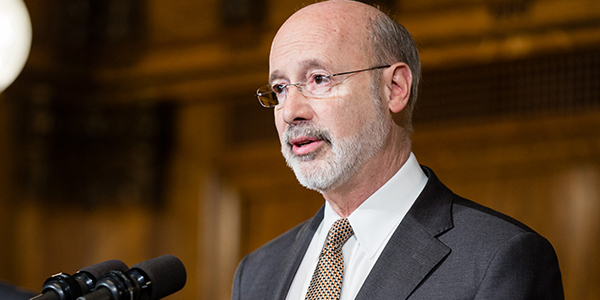By Christen Smith
Pennsylvania joined the U.S. Climate Alliance this week after releasing its own action plan to achieve a 26% reduction in statewide greenhouse gas emissions by 2025.
The alliance was established in 2017 after President Trump withdrew the U.S. from the Paris Agreement, a global initiative to limit the increase in global temperature to below 2 degrees Celsius above pre-industrial levels. Since then, 24 states — including six in PJM — have supported the alliance’s efforts to implement environmental policies that target carbon emissions and promote use of clean energy resources.
“With the federal government turning its back on science and the environment, I am proud to join with states that are leading the way towards new climate solutions and taking concrete actions to reduce greenhouse gas emissions,” Pennsylvania Gov. Tom Wolf said in a statement. “States like Pennsylvania must take action to reduce greenhouse gas emissions and protect our communities, economies, infrastructures and environments from the risks of a warming climate.”
In January, Wolf signed an executive order committing the state to reducing its GHG emissions by 26% over the next seven years compared to 2005 levels and setting an additional target of 80% by 2050. On Monday, the administration released a third update to the state’s decade-old Climate Action Plan that identified 15 steps capable of reducing carbon emissions by 21% by 2025, including investing in renewable energy resources, boosting the use of electric vehicles and incentivizing green building projects.
“Perhaps the biggest recommendation of the Climate Action Plan is that a team effort is needed to reduce greenhouse gas emissions in Pennsylvania,” Department of Environmental Protection Secretary Patrick McDonnell said. “Government leaders must lead by example, and businesses, farms, community organizations and citizens can all make a difference to fight climate change.”
Julie Cerqueira, executive director of the alliance, applauded Wolf’s proactive approach to climate change and said, “We look forward to supporting the governor’s wide range of climate priorities like promoting solar energy and decarbonizing its power grid while creating new, good jobs in the clean energy industry.”
‘Small Window’
Wolf’s announcement coincides with the introduction of two bills designed to increase targets for renewables in the state’s Alternative Energy Portfolio Standards (AEPS) law. The 2004 mandate requires electricity providers to buy 18% of their power from 16 renewable resources divided among two “tiers” by 2021.
State Rep. Carolyn Comitta (D) and Sen. Art Haywood (D) sponsored companion proposals, House Bill 1195 and Senate Bill 600, earlier this month that would boost the usage requirement of Tier 1 renewable resources from 8% to 30% by 2030. The plans also dedicate 7.5% of that target to in-state grid-scale solar and 2.5% to distributed solar generation, and asks the Public Utility Commission to study the benefits of an energy storage program.
“I am proud to join the calls for modernizing the Alternative Energy Portfolio Standards,” Comitta said on April 17. “Our state has already made important investments in alternative and clean-energy technologies, but we must do more. Adjusting our electrical energy requirements to 30% by 2030 will solidify our path to reducing our carbon footprint and advance Pennsylvania toward becoming a national energy leader.”
The Clean Power PA Coalition threw its support behind the bills in a statement on Thursday and urged legislators to support proposals to limit carbon emissions.
“Scientists tell us we have a small window of time left in order to prevent the most catastrophic impacts of climate change beyond the dangerous impacts we are already experiencing,” the coalition said. “With leadership from Gov. Wolf and the General Assembly, we can build on the strong commitments that have already been made and couple them with equally strong policies that will create jobs and keep our families healthy.”
Meanwhile, state Republicans lead discussions on another plan to prop up aging nuclear reactors with subsidies from a newly created third tier in the AEPS. The House Consumer Protection Committee met for a third time on Monday to discuss the merits of House Bill 11 with executives from across the energy industry, where divisions between nuclear power and fossil fuels run deep. (See Nuke Talks Continue in Pa. Assembly.)
It’s unclear if the legislature will pass HB 11 — or the similar SB 510 (See Pa. Lawmakers Introduce 2nd Nuke Subsidy Bill) — before Exelon begins shuttering Three Mile Island in June. While the state’s action plan calls for policies that would keep TMI and the state’s four other nuclear facilities from closing down, Wolf has not yet signaled support for either bill.




